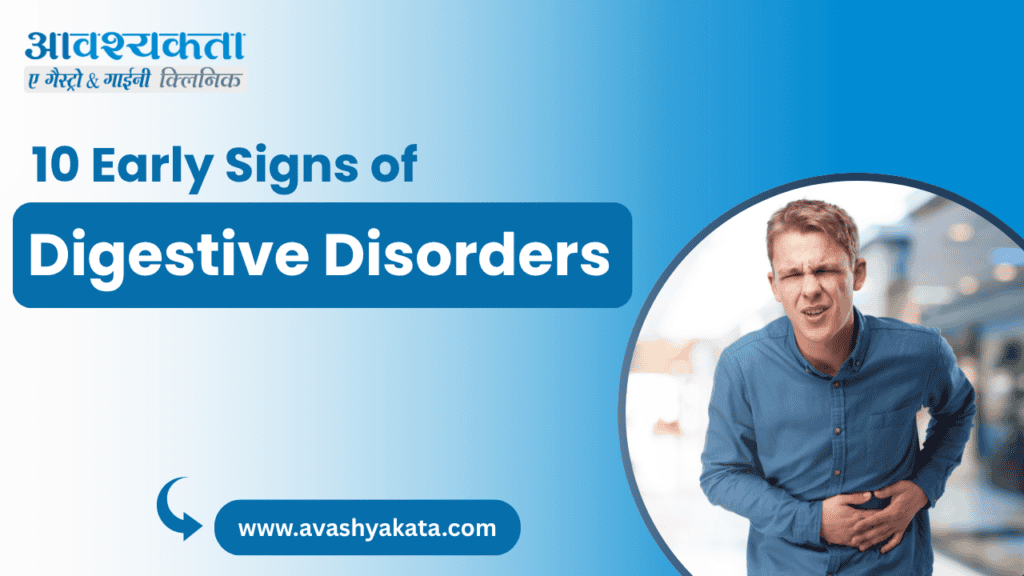
Overall health depends on digestive health, even though early symptoms of digestive diseases are frequently ignored or written off as minor annoyances. It is essential to identify these early symptoms for prompt response and efficient care. Dr. Indresh Dixit, a renowned gastroenterologist from Varanasi, stresses the significance of heeding these warning indicators to avert more severe health problems.
1. Persistent Bloating and Gas
Constant bloating with excessive gas can be a sign of underlying digestive problems, such as small intestinal bacterial overgrowth (SIBO) or irritable bowel syndrome (IBS); however, occasional bloating is normal. In addition to causing discomfort, these disorders may interfere with the absorption of nutrients, which could result in additional health issues.
2. Chronic Heartburn or Acid Reflux
Gastroesophageal reflux disease (GERD) may be indicated if there are more than two heartburn episodes per week. GERD is frequently brought on by stomach acid reflux irritating the lining of the oesophagus. If left untreated, GERD can lead to more severe conditions, including oesophagal ulcers or even cancer.
3. Unexplained Weight Loss or Gain
Weight fluctuations that occur suddenly and without explanation may be a sign of digestive problems. Problems with malabsorption, which occur when the body is unable to effectively absorb nutrients, such as in Crohn’s disease or celiac disease, can lead to weight loss. On the other hand, diseases like hypothyroidism, which can slow down metabolism, may be linked to weight gain.
4. Changes in Bowel Habits
Inflammatory bowel disease (IBD) and IBS can be indicated by changes in bowel movements, such as chronic diarrhea, constipation, or a combination of the two. Abdominal pain, bloating, or urgency may accompany these changes, impacting comfort and day-to-day functioning.
5. Abdominal Pain or Cramping
Frequent cramping or pain in the abdomen, particularly after eating, may indicate gallstones, ulcers, or gastritis, among other digestive problems. A medical evaluation is necessary for a proper diagnosis because the location and type of pain may give hints about the underlying cause.
6. Nausea and Vomiting
Some digestive conditions, including liver illness, gastritis, and peptic ulcers, can cause frequent nausea or vomiting. These symptoms highlight the need for immediate medical intervention since they can result in electrolyte imbalances and dehydration.
7. Fatigue and Nutrient Deficiencies
Nutrient deficits brought on by malabsorption in diseases like celiac disease or IBD may be the cause of chronic fatigue. Anemia and general weakness can result from deficiencies in iron, vitamin B12, and other vital nutrients, which can affect general health and quality of life.
8. Food Intolerances and Sensitivities
When specific foods, such as dairy or gluten, cause discomfort after consumption, it may be a sign of a food intolerance or sensitivity. Bloating, gas, diarrhoea, or abdominal pain are some of the symptoms, and properly managing these symptoms requires knowing what trigger foods are.
9. Blood in Stool
It can be concerning to notice blood in the stool, which can indicate anything from hemorrhoids to more serious problems like colon cancer. To identify the cause and start the right treatment, a medical evaluation is important.
10. Difficulty Swallowing
GERD and esophageal strictures are two esophageal illnesses that can cause dysphagia, or difficulty swallowing. To determine and treat the underlying cause of this ailment, which may result in nutritional inadequacies, a medical evaluation is necessary.
When to Consult a Gastroenterologist
If you’re experiencing any of the above symptoms persistently, it’s advisable to consult a gastroenterologist. Early diagnosis and treatment can prevent complications and improve quality of life. Dr. Indresh Dixit, with his expertise in gastroenterology, offers comprehensive evaluation and personalized treatment plans to address various digestive disorders.
Conclusion
Recognizing the early signs of digestive disorders is crucial for timely intervention and effective management. If you’re experiencing persistent digestive symptoms, don’t hesitate to consult a healthcare professional. Dr. Indresh Dixit, a renowned gastroenterologist in Varanasi, is dedicated to providing comprehensive care for various digestive health concerns.
Location and Clinic Details
Book an appointment with Dr. Indresh Dixit, the Best Gastroenterologist in Varanasi
Address: Bagh Bariyar Singh, C 6/85, near Saroaja Petrol Pump, Piplani Katra, Chetganj, Varanasi, Uttar Pradesh 221001
📞Call us👉: 093696980800
Visit our website👉: https://avashyakata.com/dr-indresh-dixit-gastroenterologist/
Follow us on:👉: Instagram, Facebook & Youtube
FAQs
Q1. What are the common causes of digestive disorders?
Digestive disorders can result from various factors, including infections, autoimmune conditions, lifestyle choices, and genetic predispositions. Conditions like IBS, IBD, celiac disease, and GERD are among the common digestive disorders.
Q2. How can I maintain good digestive health?
Maintaining a balanced diet rich in fibre, staying hydrated, regular physical activity, managing stress, and avoiding excessive use of NSAIDs can promote digestive health.
Q3. Are digestive disorders curable?
Some digestive disorders can be managed effectively with lifestyle changes and medication, while others may require ongoing treatment to control symptoms. Early diagnosis is key to effective management.
Q4. Is it necessary to undergo diagnostic tests for digestive issues?
Yes, diagnostic tests like endoscopy, colonoscopy, blood tests, and imaging studies help in accurately diagnosing the specific digestive disorder, enabling targeted treatment.

